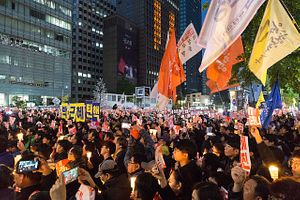On Friday morning, South Korea’s constitutional court upheld former President Park Geun-hye’s impeachment in a unanimous 8-0 decision. With the court’s ruling, Park becomes the first South Korean president to be impeached from office. South Korea will hold presidential elections 60 days from now instead of in December 2017, as originally scheduled.
Park was impeached on December 9, 2016, after the National Assembly voted 234-56 to remove her from office. The Assembly’s vote came after weeks of protests in Seoul, drawing crowds of hundreds of thousands of people (and in excess of a million on certain days) against Park. The South Korean public was incensed after a scandal emerged around the improper involvement of Choi Soon-sil, a personal friend of Park’s, in affairs of state. Over the course of the scandal, it emerged that Choi had inappropriately intervened in government policy, influenced Park’s decision-making, and engaged in corrupt practices to enrich herself and her family.
Friday’s decision by the court represents a watershed moment in South Korean politics and concludes one turbulent political process, but begins another. South Korea’s political parties will now scramble as an election fast approaches in early May.
Moon Jae-in, the presidential contender from the center-left opposition Minjoo Party, has performed well in recent polls, suggesting that the country may be in for a partisan change in the presidency. A poll released earlier this week by Realmeter showed Moon with 36.4 percent support among likely candidates, keeping him at the top of likely presidential contenders for nine weeks straight.
Park’s conservative Saenuri Party split in December following the impeachment vote, with many conservative lawmakers looking to distance themselves from the disgraced president. Overall, South Korean prosecutors have indicted dozens of people in connection with the Choi Soon-sil scandal, including South Korean conglomerate Samsung’s billionaire vice chairman and leader-in-waiting Jay Y. Lee.
































